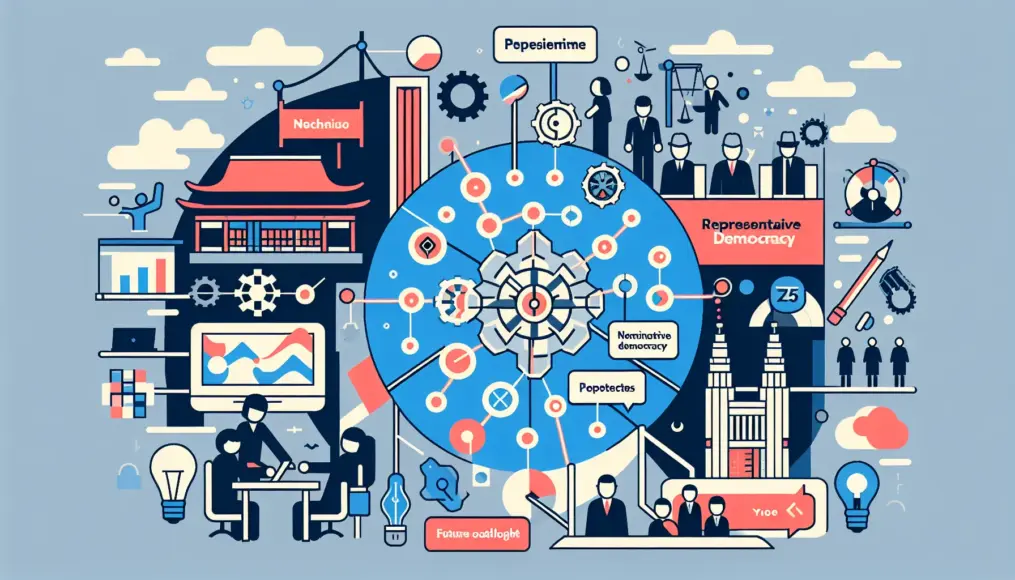Representative democracy plays a crucial role in our society. The system, where elected representatives reflect citizens’ opinions and make policy decisions through elections, forms the backbone of democracy. However, this system comes with its own set of advantages and a range of challenges. In this article, we’ll thoroughly analyze the effectiveness of representative democracy and explore how it impacts our daily lives.
This piece is particularly engaging for those interested in politics and anyone concerned about the future of democracy. We’ll delve into everything from the fundamental concepts of representative democracy to its pros and cons, as well as its significance in contemporary society. We invite you to stay with us until the end.
- An overview of the basic concepts and historical background of representative democracy
- Benefits such as increased citizen participation and more efficient policymaking
- A discussion on the challenges and significance of this system in modern society
What is Representative Democracy?
Representative democracy is a crucial concept within modern political systems. In this system, citizens elect representatives through elections, and these representatives make policy decisions on their behalf. By aggregating the opinions of the public, representatives reflect those views in a democratic decision-making process. This framework is a fundamental element of democracy and is widely recognized as a means of political participation.
Historically, representative democracy evolved from the direct democracy of ancient Greece. As it became increasingly challenging for citizens to engage in direct discussions and make decisions, the system of electing representatives emerged. In this way, representative democracy has evolved over time and has influenced political systems across various countries.
Explanation of Key Concepts
Representative democracy is a system where elected representatives act on behalf of citizens to reflect their opinions in political matters. These representatives, chosen through elections, are responsible for making policy decisions and proposing legislation. A defining feature of this system is that the representatives, elected via the electoral process, serve as the voice of the citizens. Therefore, they are expected to communicate effectively with their constituents and act based on the election outcomes.
Such a system is a vital means of realizing democratic ideals and is widely adopted in the political systems of many countries. Because citizens can express their opinions through elections, there is a heightened sense of political engagement among the populace.
- Representative democracy involves elected representatives making policy decisions
- Representatives chosen through elections serve as the voice of the citizens
- This system is widely implemented across various political systems
Overview of Historical Background
The roots of representative democracy trace back to ancient Athens in Greece. At that time, direct democracy allowed all citizens to participate directly in discussions and decisions. However, as populations grew and societies became more complex, direct participation became increasingly impractical, leading to the need for a system to elect representatives.
In the modern era, representative democracy spread globally following significant events like the American Revolution and the French Revolution. These historical milestones emphasized the principles of democracy and the importance of rights, influencing political systems in various countries. Today, representative democracy continues to be adopted in many nations, contributing to the ongoing development of democratic practices.
If this article has helped deepen your understanding of representative democracy, you might also be interested in gaining further insights into electoral systems in general. Check out this article on “Japan’s Electoral System: Exploring Its History and Modern Challenges.” It delves into the historical background of Japan’s electoral system and its current challenges, providing valuable information to reaffirm the importance of political participation.
- Representative democracy originated from direct democracy in ancient Greece
- The need for electing representatives arose from population growth and societal complexity
- Historical events in modern times spread representative democracy worldwide
The Benefits of Representative Democracy
Representative democracy offers a variety of advantages. First and foremost, it promotes citizen participation. By electing representatives through elections, citizens become more engaged in politics and develop a sense of anticipation that their opinions will be reflected in decision-making. Additionally, this system provides more opportunities for citizens to express their views, leading to increased political involvement. Such a sense of participation is a vital component of a thriving democracy.
Moreover, the efficiency of policy-making is another significant benefit of representative democracy. When elected officials make decisions, they can engage in effective discussions thanks to their specialized knowledge and experience, allowing for swift decision-making. This creates a system that can respond quickly to the challenges faced by the nation or community.
Promoting Citizen Participation
One of the defining characteristics of representative democracy is that it allows citizens to express their opinions through elections. By providing opportunities for individuals to voice their views and have them reflected in political processes, engagement in politics deepens. Elected representatives, in turn, must prioritize dialogue with citizens to fulfill their campaign promises. This encourages representatives to listen to the voices of their constituents and respond to their needs.
As citizen participation increases, the political landscape becomes more transparent, fostering greater trust. When people share their opinions, the integrity of politics is upheld.
- Citizens can express their opinions through elections
- Representatives are more inclined to engage in dialogue with citizens
- Political transparency and trust are enhanced
Streamlining Policy-Making
In representative democracy, policies are determined by elected officials with specialized knowledge. This expectation leads to more efficient discussions. In settings like legislative bodies, diverse opinions are consolidated and policies are examined from expert perspectives, resulting in high-quality decision-making. The presence of representatives with varied viewpoints contributes to the formation of well-rounded policies.
Additionally, the speed of policy-making improves. Elected representatives are accountable for their decisions, creating a structure that enables swift responses. This allows for effective measures to be implemented swiftly, addressing national or local issues in a timely manner.
If you found this article interesting, you might also enjoy this piece: “Understanding Electoral Systems: A Clear Explanation of Single-Member Districts and Proportional Representation! Exploring Their Differences and Benefits.” Gaining a grasp of electoral systems can further enhance your understanding of the benefits of representative democracy and the importance of citizen participation.
- Policies are decided by representatives with specialized knowledge
- Diverse opinions lead to high-quality decision-making
- A structure is in place for swift policy decisions
The Drawbacks of Representative Democracy
While representative democracy offers numerous advantages, it also comes with its fair share of drawbacks. Two of the most significant issues are the accountability of representatives and the growing dissatisfaction and distrust among citizens. Representatives are expected to voice the opinions of the people, but when their accountability is unclear, those elected can act on their own judgment, ultimately betraying the expectations of their constituents. Increased dissatisfaction and distrust in politics can also undermine faith in democracy itself.
By understanding these drawbacks, we can identify challenges within representative democracy and work toward creating a more effective political system.
The Accountability of Representatives
In a representative democracy, elected officials are expected to reflect the views of their constituents. However, they often act based on their own judgment, and there are times when they fail to meet the expectations of the citizens after elections. This raises questions about their accountability, and unfortunately, that accountability is frequently ambiguous. The issue lies in how representatives explain their decisions to the public once they are elected.
Moreover, the lack of clear accountability makes it difficult for citizens to criticize representatives when they err. This can diminish civic engagement and ultimately lower the quality of democracy itself.
- Accountability of representatives is often unclear
- They may fail to meet citizens’ expectations
- Ambiguous accountability can reduce civic engagement
Citizens’ Dissatisfaction and Distrust
In representative democracy, rising dissatisfaction and distrust among citizens pose a significant challenge. When representatives fail to honor campaign promises or implement policies that ignore public opinion, citizens increasingly feel that their voices are not being heard. Persistent situations like this can lead to a loss of trust in politics, resulting in diminished enthusiasm for democratic participation.
Dissatisfaction and distrust can also contribute to societal division. When citizens become disillusioned with politics, they may lose interest altogether, jeopardizing the foundation of democracy. To address these issues, it is essential to strengthen communication between citizens and their representatives and promote transparency in governance.
- Representatives may ignore citizens’ opinions
- Loss of trust in politics leads to decreased participation
- Dissatisfaction can contribute to societal division
The Significance of Representative Democracy in Modern Society
In today’s world, representative democracy plays an increasingly vital role. As globalization progresses, an environment has emerged where the political and economic landscapes of various countries influence one another. In such circumstances, representative democracy serves as a powerful tool for reflecting citizens’ opinions and addressing international challenges. Looking ahead, the evolution of representative democracy and its role in creating a sustainable society is of paramount importance.
In this section, we will explore the relationship between globalization and democracy, as well as how representative democracy is expected to develop in the future. We will also consider the significance of democracy and the necessary elements for its evolution.
Globalization and Democracy
Globalization fosters cross-border economic activities and cultural exchanges, connecting people worldwide while also impacting the politics of individual nations. In this context, representative democracy is a crucial system that aggregates citizens’ opinions and possesses the capability to tackle international issues. For instance, on issues such as environmental concerns, human rights, and economic disparities—problems that transcend national borders—representatives play a key role in coordinating policies within an international framework.
Moreover, with the advancement of globalization, information spreads rapidly, making citizens more aware and sensitive to global events, which encourages them to form their own opinions. Against this backdrop, representative democracy becomes a foundation for reflecting citizens’ voices and striving for a better society.
- Globalization brings cross-border impacts
- Representative democracy holds the power to address international issues
- Citizens become more aware of global events and form their own opinions
Looking Ahead
The future of representative democracy is filled with potential. As technology evolves and we move further into an information-driven society, the ways in which citizens participate in politics will change. For example, the rise of online voting and digital platforms for civic engagement will make it easier for more people to express their opinions. Such changes will enable a broader range of perspectives to be reflected in politics, ultimately enhancing the quality of democracy.
Additionally, the future of representative democracy will call for a focus on dialogue with citizens and the promotion of transparent governance. To gain the trust of the public, representatives must sincerely listen to the voices of the citizens. This approach will lead to the evolution of representative democracy into a more robust system that contributes to the achievement of a sustainable society.
- Technological advancements will transform civic participation
- Online voting and digital platforms will facilitate opinion expression
- Dialogue with citizens and transparency will be key elements
Conclusion
Representative democracy plays a crucial role in reflecting citizens’ opinions in today’s political landscape. By electing representatives through elections, citizens are encouraged to engage in politics, leading to more efficient policy-making. However, this system also faces challenges, such as accountability issues and public dissatisfaction. As globalization continues to advance, representative democracy not only has the capacity to tackle international issues but also opens up new avenues for citizen participation through emerging technologies.
Throughout this article, we’ve provided insights into the advantages and disadvantages of representative democracy, prompting a deeper reflection on its significance. Understanding the potential of this system is vital as we strive to build a better society.
- Representative democracy is a key system for reflecting citizens’ opinions.
- It’s important to understand both the benefits and drawbacks.
- New challenges and future prospects in light of globalization.
As we observe the evolution of democracy, we’d love to hear your thoughts and comments!



Comment